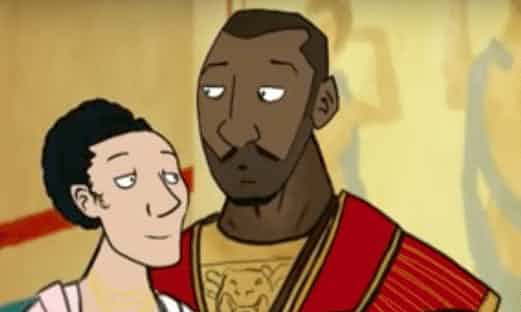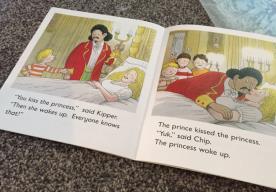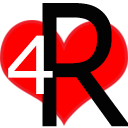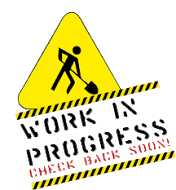School Books to offend no minority: Ravitch: (Language police)
American school books are all gender and race balanced. No stereotypical roles are allowed. No women in the kitchen, ...

This book describes the regime of censorship that has quietly spread throughout educational publishing in response to pressure groups from both the left and the right. I have sought to document the pervasiveness of this phenomenon by obtaining materials from publishers, testing agencies, state boards of education, and professional associations.
Ravitch, Diane. The Language Police: How Pressure Groups Restrict What Students Learn (p. 2). Knopf Doubleday Publishing Group. Kindle Edition.
[...]Initially these practices began with the intention of identifying and excluding any conscious or implicit statements of bias against African Americans, other racial or ethnic minorities, and females, whether in tests or textbooks, especially any statements that demeaned members of these groups. These efforts were entirely reasonable and justified. However, what began with admirable intentions has evolved into a surprisingly broad and increasingly bizarre policy of censorship that has gone far beyond its original scope
Ravitch, Diane. The Language Police: How Pressure Groups Restrict What Students Learn (pp. 3-4). Knopf Doubleday Publishing Group. Kindle Edition.
When publishers of textbooks and tests conduct bias and sensitivity reviews, these reviews are never released to the public; they are proprietary materials, and they belong to the company. I could not find a publisher willing to release them. State education departments guard the results of their bias reviews with equal zeal,
Ravitch, Diane. The Language Police: How Pressure Groups Restrict What Students Learn (p. 7). Knopf Doubleday Publishing Group. Kindle Edition.
There are three ways, the guidelines assert, to ensure fairness in testing. One is by “representational fairness,” another is by reviewing “language usage,” and a third is by removing “stereotypes.” In addition, certain inflammatory topics must be avoided. Each of these versions of “fairness” leads the publisher to specify precisely what language and which ideas will be allowed and which will be banned. As I read through the guidelines, I began to understand why the publisher advised us that everything written before 1970 was biased. Few writings before that date could possibly meet the specifications laid out in the guidelines.
Ravitch, Diane. The Language Police: How Pressure Groups Restrict What Students Learn (p. 21). Knopf Doubleday Publishing Group. Kindle Edition.
Consider the Multicultural Guidelines published by Scott Foresman– Addison Wesley.1 Scott Foresman has long experience in the business of writing bias guidelines. In 1972, it published Guidelines for Improving the Image of Women in Textbooks. In 1990, it created a “multicultural steering committee” to ensure that the company’s editorial products toed that line.
The Scott Foresman–Addison Wesley (SF-AW) bias guidelines comprise 161 pages, longer than most of their counterparts. They lay out a consistent party line for editors, authors, and illustrators. Combining a tone of idealism and authoritarianism, they impose a strict code of political and social correctness. They call for sweeping social and pedagogical changes.
The SF-AW document envisions the creation of a new society composed of “multicultural persons.” These are people who look at others and see not an individual but a person who represents a group; the multicultural person understands that people from each group have distinctive ways of thinking, acting, and believing. Ordinarily, in the world of bias guidelines, the identification of the individual with the characteristics of a group is considered stereotyping. Scott Foresman–Addison Wesley overlooks this inconsistency.
The document is an extended celebration of multiculturalism. It is not about so limited a goal as reducing prejudice and promoting understanding among children from different groups. Multicultural education, it says, is not only about changing the content of textbooks and the attitudes of teachers and students, but about demanding specific pedagogical approaches, such as hands-on projects, self-esteem building, collaborative learning, constructivism, multiple intelligences, and an extensive catalog of other innovations. There is nothing wrong with any of these methods, and no doubt good teachers use some or all of them. But it is inappropriate for a publishing company to tell teachers who prefer other classroom methods that they may be guilty of racial, ethnic, and gender bias.
The SF-AW guidelines require that the company’s products must each contain “a fair and balanced representation” of people from various cultural groups, racial groups, ethnic groups, and religious groups; males and females; older people; and people with disabilities. Not only the characters in the books, but those portrayed in illustrations must be balanced by race, ethnicity, and gender. Authors too must be selected by their gender and race.
The guidelines say that text illustrations must include people of all physical types, all ages, a mix of tall and short, heavy and thin, including people with disabilities. Although not all groups must be equally represented in every illustration, each book must have a full balance by race, gender, ethnicity, age, and disability. Illustrations must include all varieties of family units, including a family headed by two parents, by one parent, by grandparents, by aunts/uncles, by older siblings, and by other adults. Illustrators must pay close attention to such matters as “skin tones, hair colors and textures, eye colors, and facial features.” Portrayals of diverse members of a multicultural society must be positive and uplifting so that students get a “sense of pride and self-worth.” The guidelines include forty pages of photographs of children from different racial and ethnic groups so that illustrators will know what an African American boy, a Filipino girl, a Latin American boy, or a European American girl of eight to twelve looks like.
The guidelines admonish writers about what they must not say. It is objectionable, writers are warned, to write “Primitive cultures sometimes lack adequate medical care,” because there are no “primitive cultures.” One must not say, “Most Vietnamese are poor peasants,” because such a statement, even if true, is condescending. One must not say, “Mr. Vargas, an agricultural adviser, is part of a life-and-death struggle to bring black Africa into the twentieth century.” Such a statement is biased because black Africa was already in the twentieth century, even if the author intended to say that its agricultural practices were not. It is objectionable for an author to refer to anyone’s language as a dialect; to refer to African tribes rather than African ethnic groups; or to refer to African huts (the dwellings in rural Africa must be described as little houses).
The language code tells how to describe the members of various American Indian groups; they must be identified as specific “nations,” such as Shoshone, Ojibwa, or Choctaw, rather than by the generic term American Indian or Native American. Authors must ask the representatives of the group itself what name they prefer, rather than relying on historical accounts (writers should refer to Kakota, Dakota, or Nakota, not Sioux; to Tohono O’odham, not Papago; to Diné Nation, not Navajo).
Ravitch, Diane. The Language Police: How Pressure Groups Restrict What Students Learn (pp. 34-36). Knopf Doubleday Publishing Group. Kindle Edition.
Social Engineering by Hollywood & media school books, schools and Universities, leaves everyone profoundly brainwashed. They think that 2 dad families are normal, that men should work in the kitchen, that women fight as good or better than men and computer nerds are mostly black. The were programmed to deeply believe the Equality dogma: that all races are equal.
Almost all "Racists" like us grew up leftist indoctrinated and somehow were de-programmed by seeing the truth, through scientific research,
&&Put some images, ....
&&linkt to book and review
Also Pippi Longstocking had to be changed, Huckleberry Finn &&&
Sweden's Holy War on Children's Books www.gatestoneinstitute.org/8086/sweden-childrens-books May 21, 2016 ... The desire "not to offend," taken to its logical conclusion, is a totalitarian impulse, ... School photos must obviously be free of national symbols. ..... profanity, or any broad-brush slurring of any race, ethnic group or religion.
Oxford University Press Articles - Breitbart www.breitbart.com/tag/oxford-university-press/ Jan 14, 2015 ... A leading publisher of schoolbooks has banned its authors from mentioning pigs, ... anything pork related in their books, lest the words offend Muslims and Jews. ... ***Horse Race LiveWire*** Trump Postpones Chicago Event.
Books should reflect a diversity of children’s experiences. The picture books on this list challenge gender stereotypes. These titles celebrate the fact that not every child fits into society’s preconceived notion of what it means to be a boy or a girl. I don’t want my kids to grow up feeling limited by their gender. Kids need to know that if they prefer diggers to ballet slippers or knitting to baseball, it doesn’t matter if they are boys or girls. Children need to take pride in what they do and learn to accept that the diversity of their peers’ experiences and identities. [Trigger warning, very PC: 14 Children’s Books that Challenge Gender Stereotypes]
Trigger Warning: Very PC Diversity 102, Educator Resources, Gender/LGBTQ Diversity, Guest Blogger Post, New Releases, [No More “Illegal Aliens”]
WHY DO WE NEED DIVERSE BOOKS IN NON-DIVERSE SCHOOLS?
'Infantilized' College Students Need 'Safe Spaces' to Avoid Scary ...
www.breitbart.com/.../infantilized-college-students-need-safe-spaces-to-avoid -scary-free-speech/
Mar 23, 2015 ... ... coloring books, bubbles, Play-Doh, calming music, pillows, blankets, and a ... He added that the fear of offending students has led to professors ... Eric Posner, from the University of Chicago Law School, wrote on ... Transgender Student Beats Female Competitors To Final In Alaskan Track And Field Race.
Oxford University Press bans mention of pigs in books to avoid ...
https://www.jihadwatch.org/.../oxford-university-press-bans-mention-of-pigs- in-books-to-avoid-offending-muslims
Jan 14, 2015 ... Oxford University Press (OUP) said all books must take into consideration other .... You are just a hindhu,not from the muslim master race. ..... Actually, they should ban the mention of Muslims to avoid offending pigs. ..... Philippines (106), Poland (12), Portugal (2), public schools (3), Qatar (58), Quebec (12) ...
What I Learned in Kindergarten | American Renaissance
www.amren.com/.../all-i-really-need-to-know-about-race-i-learned-teaching- in-kindergarten/
Sep 23, 2014 ... I got my education about race as a kindergarten teacher. ... I finally got an interview with Atlanta Public Schools, which had its headquarters downtown. ... I recently came across that old Robert Fulghum book in the garage, and took a ...... as a bigot and more than likely I will offend them resulting in a scuffle.
schools in general
Dumbing Down: Outcomes-based and politically correct - the impact of the Culture Wars on our schools
Links
PIG Search Results
The Corner
Aug 25, 2003 ... David Bromwich has a long, readable, and quite positive review of Diane Ravitch's new book, The Language Police: How Pressure Groups ...
Rain of Errors
Oct 17, 2013 ... The most frustrating thing about Diane Ravitch's new book, Reign of Error, ... She wrote another whole book (The Language Police) that vividly ...
Stooping to Stupidity | The American Spectator
Oct 13, 2003 ... As Diane Ravitch demonstrates in The Language Police: How Pressure Groups Restrict What Students Learn (Alfred A. Knopf, 255 pages, $24) ...
National Association of Scholars
Over at Pajamasmedia, “Zombie” is in the midst of a five part analysis of the Texas textbook battle. In The Language Police (2004), Diane Ravitch argued that to ...
National Association of Scholars
Sep 8, 2010 ... ... part analysis of the Texas textbook battle. In The Language Police (2004), Diane Ravitch argued that to avoid offending any conceivable…
Sprachpolizei: Ein Buch über echt amerikanische Probleme Das ...
Ravitch nennt das PC-Regiment beim Namen: "Die Sprachpolizei" (The Language Police) lautet der Titel ihres Buches. Ravitch seziert das Weltbild, das ...
National Association of Scholars
In The Language Police (2004), Diane Ravitch argued that to avoid offending any conceivable… Page 174 of 263 pages ‹ First < 172 173 174 175 176 > Last ›.
The Myth of White Privilege - American Renaissance
Jul 28, 2011 ... {snip} Then there is the Dayton, OH police department, which recently discarded its recruit ... A racial slur isn't even necessary for a white person to incur the thought police's wrath. ... the three textbook publishing giant McGraw-Hill by renowned education historian Diane Ravitch: ... (The Language Police, p.
Creationism, pluralism and the compromising of science | Books ...
Mar 1, 2005 ... In her book The Language Police, Diane Ravitch details the censorship of school materials, in particular textbooks by 'bias and sensitivity' ...
Where Has All the English Gone? | Frontpage Mag
Mar 13, 2012 ... For a person like me who learned English as a second language, the .... In the book "The Language Police" by Diane Ravitch, the author ...
More on the West-Is-Evil Narrative | The Occidental Observer - White ...
Feb 16, 2013 ... In The Language Police: How Pressure Groups Restrict What Students Learn ( 2003), Ravitch describes how textbook publishers achieve the ...
The tyranny of therapism | Books & Essays | spiked
Jun 21, 2005 ... The committees, says Diane Ravitch in her recent book The Language Police, believe such references could 'be so upsetting to some children ...
Google search Results
The Language Police: How Pressure Groups Restrict ... - Amazon.com
The Language Police: How Pressure Groups Restrict What Students Learn [Diane Ravitch] on Amazon.com. *FREE* shipping on qualifying offers. If you're an ...
The Language Police by Diane Ravitch | PenguinRandomHouse.com
About The Language Police. If you're an actress or a coed just trying to do a man-size job, a yes-man who turns a deaf ear to some sob sister, an heiress aboard ...
Reviewing Diane Ravitch's book 'The Language Police'
Review of Diane Ravitch's book 'The Language Police: How Pressure Groups Restrict What Students Learn'
'The Language Police' - The New York Times
11 de mai de 2003 - 'The Language Police'. By DIANE RAVITCH MAY 11, 2003 ... of rules to screen out language and topics that might be considered controversial ...
Diane Ravitch: The Language Police: How Pressure ... - The AV Club
So argues Diane Ravitch in her muckraking exposé The Language Police, which explores how both sides censor and control textbooks and tests. Ravitch ...
Language Police: Restricting What We learn - YouTube
Diane Ravitch discusses her book The Language Police: How Pressure Groups Restrict What Students Learn ...
The Language Police: How Pressure Groups Restrict ... - Goodreads
The Language Police has 596 ratings and 69 reviews. ... a boy's night out, Diane Ravitch's internationally acclaimed The Language Police has bad news for you: ...
California: The Language Police Are on the Job! - Diane Ravitch Blog
The Language Police by Diane Ravitch | commentary
1 de jun de 2003 - The Language Police: How Pressure Groups Restrict What Students Learn by Diane Ravitch Knopf. 272 pp. $24.00. Diane Ravitch's account of ...
Language police - Wikipedia
Language police may refer to: The Language Police, a book by Diane Ravitch; Latvian State Language Center, a Latvian government body; State Language ...
 Racism is Love
Racism is Love 




